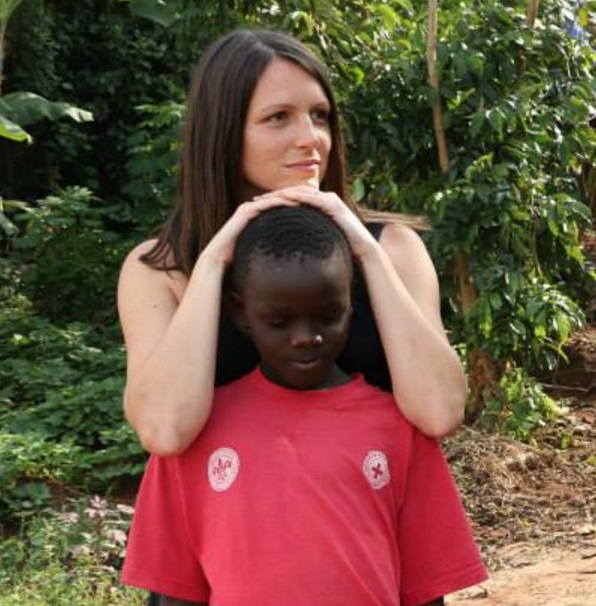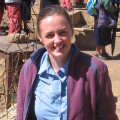“Problems Don’t Define a Place, People Do”: A Journey into Uganda
This is a traveler story. (Read others or nominate yourself.)
With NPR news, Instagram, and Netflix at our fingertips, it’s easy to think we understand a place, even if we’ve never spent much time there. Amy Carst and her family moved to Uganda for four months, and they realized the Africa they’d heard about wasn’t the Africa they came to know.
Here’s her story:
It is 5:30 in the morning. I’m sitting under my mosquito netting with a cup of strong coffee while a preacher’s sermon is projected in the local Luganda language from a nearby church. When we arrived in Uganda, I was annoyed by this loud, peculiar, predawn disturbance. But now, it’s background noise, much like a window fan in summer or water flowing down a backyard stream.

At first, my kids thought this ritual was “scary” or “creepy”—now it’s normal. In Vermont, where we’re from and where we’ll return, thick blankets of snow muffle and mute every sound of life in the dark of morning. Will the silence disturb me from my sleep as this projected, foreign, male voice did when we first arrived here?
I often fear what I don’t understand. I think we all do. And I had fears before I came here based on what friends warned me about or what the news told me. But those fears were quickly assuaged, and my fear of Uganda was replaced with love for Uganda.

Here’s what I came to realize about Uganda and what replaced my fear with love:
Africa is a land of opportunity.
The phrase “unique business” is an oxymoron in America. As an entrepreneur, I am always trying to think of the next big idea. In the U.S., no matter how amazing, inspired, or unique an idea may be…it’s been done. I could wake in the morning, sit straight up in bed, and exclaim, “I’ve got it! A coffee shop that serves Ethiopian coffee, brewed in pineapple juice, served in beer steins by Uruguayan servers who ride around the shop on unicycles, singing the theme song from Grease!” And guaranteed someone already has it done. Not so in Africa. The potential here is astounding.

And that opportunity is being acted upon with exciting results.
Hundreds of successful tech companies have emerged from the technological revolution in Africa, including a huge game-changer, Mobile Money, which allows customers to text money deposited in a kiosk to a friend. The sender hands over the cash and provides the receiver’s cell number. The receiver then visits a mobile money kiosk in his or her local area and retrieves the funds.
Innovative, inspiring, and ingenious! And it’s expected these sorts of innovations will eventually make a global impact: By 2050, Africa’s GDP is projected to be more than the U.S. and the EU combined.

Problems don’t define Africa. People do.
On my first visit to Uganda, without my family, my priorities were to raise money, spread awareness about the problems there, and—quite honestly—relish in the knowledge that a mere 10 days in Africa had transformed me from ordinary to inspiring. As time went on, however, and I spent more time there, began doing business, made friends, and started to uncover the many layers of the country, my perspective changed.
Uganda doesn’t need my aid, charity, or pity so much as it needs business and investment from the inside out. Don’t get me wrong: aid and charity are still very much needed in Africa (I work with an orphanage, so I’m certainly not dissing aid). As is the case in most of the developing world, there are problems in Africa (corruption, poverty, and healthcare concerns are huge), but these issues don’t define this place. I see Africa as a place people can redefine, both from the inside and from beyond its borders. By reading about it, researching it, visiting, and talking about my experiences, I am changing the dialogue in my own small way.

Life has a stronger pulse here.
If you trip, fall, bump into something, drop something, or in any way deviate from the smooth, normal course of daily existence, complete strangers all turn to you—in unison—and say, “Sorry.” At first, I would respond, “Oh, it’s not your fault,” but I’ve changed my tune. I believe that this reflexive utterance of the word “sorry” from everyone within earshot or eyesight is proof of a collective consciousness.
Walk down any road and you will see life happening in every direction, in every storefront, on bicycles and on foot, in men chopping wood or selling pineapples, in women balancing impossible loads on their heads and carrying babies on their backs, in everyone laughing and talking and just being alive. Alive. I have begun to recognize the presence of something other than myself in everything I do here.
Follow Amy’s adventures on Medium @amylanecarst.
###







